Codified version of all other answers (at the time of writing):
import java.io.*;
/**
* This class is based on <a href="http://stackoverflow.com/users/2478930/cheneym">cheneym</a>'s
* <a href="http://stackoverflow.com/a/18375641/253468">awesome interpretation</a>
* of the Java {@link Runtime}'s memory query methods, which reflects intuitive thinking.
* Also includes comments and observations from others on the same question, and my own experience.
* <p>
* <img src="https://i.stack.imgur.com/GjuwM.png" alt="Runtime's memory interpretation">
* <p>
* <b>JVM memory management crash course</b>:
* Java virtual machine process' heap size is bounded by the maximum memory allowed.
* The startup and maximum size can be configured by JVM arguments.
* JVMs don't allocate the maximum memory on startup as the program running may never require that.
* This is to be a good player and not waste system resources unnecessarily.
* Instead they allocate some memory and then grow when new allocations require it.
* The garbage collector will be run at times to clean up unused objects to prevent this growing.
* Many parameters of this management such as when to grow/shrink or which GC to use
* can be tuned via advanced configuration parameters on JVM startup.
*
* @see <a href="http://stackoverflow.com/a/42567450/253468">
* What are Runtime.getRuntime().totalMemory() and freeMemory()?</a>
* @see <a href="http://www.oracle.com/technetwork/java/javase/memorymanagement-whitepaper-150215.pdf">
* Memory Management in the Sun Java HotSpot™ Virtual Machine</a>
* @see <a href="http://docs.oracle.com/javase/8/docs/technotes/tools/windows/java.html">
* Full VM options reference for Windows</a>
* @see <a href="http://docs.oracle.com/javase/8/docs/technotes/tools/unix/java.html">
* Full VM options reference for Linux, Mac OS X and Solaris</a>
* @see <a href="http://www.oracle.com/technetwork/articles/java/vmoptions-jsp-140102.html">
* Java HotSpot VM Options quick reference</a>
*/
public class SystemMemory {
// can be white-box mocked for testing
private final Runtime runtime = Runtime.getRuntime();
/**
* <b>Total allocated memory</b>: space currently reserved for the JVM heap within the process.
* <p>
* <i>Caution</i>: this is not the total memory, the JVM may grow the heap for new allocations.
*/
public long getAllocatedTotal() {
return runtime.totalMemory();
}
/**
* <b>Current allocated free memory</b>: space immediately ready for new objects.
* <p>
* <i>Caution</i>: this is not the total free available memory,
* the JVM may grow the heap for new allocations.
*/
public long getAllocatedFree() {
return runtime.freeMemory();
}
/**
* <b>Used memory</b>:
* Java heap currently used by instantiated objects.
* <p>
* <i>Caution</i>: May include no longer referenced objects, soft references, etc.
* that will be swept away by the next garbage collection.
*/
public long getUsed() {
return getAllocatedTotal() - getAllocatedFree();
}
/**
* <b>Maximum allocation</b>: the process' allocated memory will not grow any further.
* <p>
* <i>Caution</i>: This may change over time, do not cache it!
* There are some JVMs / garbage collectors that can shrink the allocated process memory.
* <p>
* <i>Caution</i>: If this is true, the JVM will likely run GC more often.
*/
public boolean isAtMaximumAllocation() {
return getAllocatedTotal() == getTotal();
// = return getUnallocated() == 0;
}
/**
* <b>Unallocated memory</b>: amount of space the process' heap can grow.
*/
public long getUnallocated() {
return getTotal() - getAllocatedTotal();
}
/**
* <b>Total designated memory</b>: this will equal the configured {@code -Xmx} value.
* <p>
* <i>Caution</i>: You can never allocate more memory than this, unless you use native code.
*/
public long getTotal() {
return runtime.maxMemory();
}
/**
* <b>Total free memory</b>: memory available for new Objects,
* even at the cost of growing the allocated memory of the process.
*/
public long getFree() {
return getTotal() - getUsed();
// = return getAllocatedFree() + getUnallocated();
}
/**
* <b>Unbounded memory</b>: there is no inherent limit on free memory.
*/
public boolean isBounded() {
return getTotal() != Long.MAX_VALUE;
}
/**
* Dump of the current state for debugging or understanding the memory divisions.
* <p>
* <i>Caution</i>: Numbers may not match up exactly as state may change during the call.
*/
public String getCurrentStats() {
StringWriter backing = new StringWriter();
PrintWriter out = new PrintWriter(backing, false);
out.printf("Total: allocated %,d (%.1f%%) out of possible %,d; %s, %s %,d%n",
getAllocatedTotal(),
(float)getAllocatedTotal() / (float)getTotal() * 100,
getTotal(),
isBounded()? "bounded" : "unbounded",
isAtMaximumAllocation()? "maxed out" : "can grow",
getUnallocated()
);
out.printf("Used: %,d; %.1f%% of total (%,d); %.1f%% of allocated (%,d)%n",
getUsed(),
(float)getUsed() / (float)getTotal() * 100,
getTotal(),
(float)getUsed() / (float)getAllocatedTotal() * 100,
getAllocatedTotal()
);
out.printf("Free: %,d (%.1f%%) out of %,d total; %,d (%.1f%%) out of %,d allocated%n",
getFree(),
(float)getFree() / (float)getTotal() * 100,
getTotal(),
getAllocatedFree(),
(float)getAllocatedFree() / (float)getAllocatedTotal() * 100,
getAllocatedTotal()
);
out.flush();
return backing.toString();
}
public static void main(String... args) {
SystemMemory memory = new SystemMemory();
System.out.println(memory.getCurrentStats());
}
}
Example output:
Total: allocated 33,554,432 (12.5%) out of possible 268,435,456; bounded, can grow 234,881,024
Used: 2,392,832; 0.9% of total (268,435,456); 7.1% of allocated (33,554,432)
Free: 266,042,624 (99.1%) out of 268,435,456 total; 31,161,600 (92.9%) out of 33,554,432 allocated
